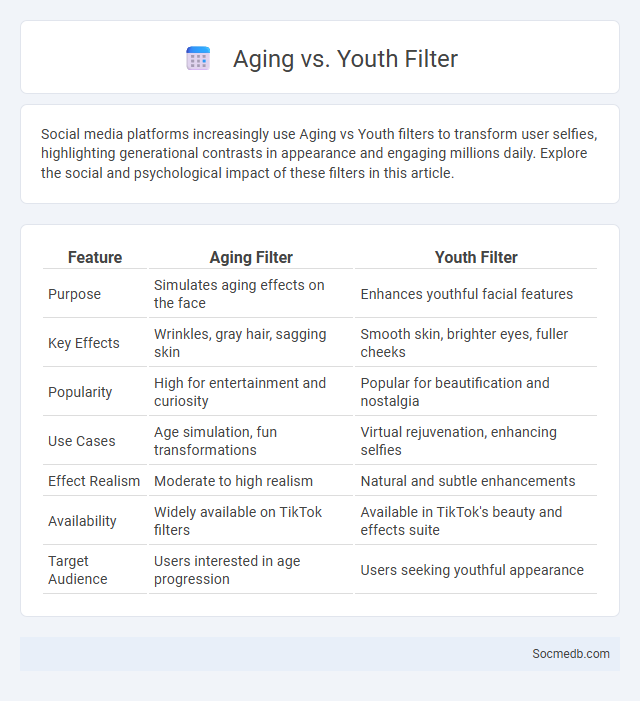
Photo illustration: Aging vs Youth Filter
Social media platforms increasingly use Aging vs Youth filters to transform user selfies, highlighting generational contrasts in appearance and engaging millions daily. Explore the social and psychological impact of these filters in this article.
Table of Comparison
| Feature | Aging Filter | Youth Filter |
|---|---|---|
| Purpose | Simulates aging effects on the face | Enhances youthful facial features |
| Key Effects | Wrinkles, gray hair, sagging skin | Smooth skin, brighter eyes, fuller cheeks |
| Popularity | High for entertainment and curiosity | Popular for beautification and nostalgia |
| Use Cases | Age simulation, fun transformations | Virtual rejuvenation, enhancing selfies |
| Effect Realism | Moderate to high realism | Natural and subtle enhancements |
| Availability | Widely available on TikTok filters | Available in TikTok's beauty and effects suite |
| Target Audience | Users interested in age progression | Users seeking youthful appearance |
Understanding the Aging Filter: How It Works
The aging filter uses advanced facial recognition algorithms and artificial intelligence to simulate the natural effects of aging on your face by analyzing skin texture, wrinkles, and facial structure changes over time. This technology integrates machine learning models trained on diverse age-related datasets to predict how features like sagging skin and graying hair will evolve, providing realistic transformations. Understanding this process enhances your use of social media filters by showcasing authentic age progression effects that resonate with human perception.
Youth Filter Explained: Technology Behind Digital Rejuvenation
The Youth Filter leverages advanced AI algorithms and neural networks to analyze facial features and apply real-time digital rejuvenation effects, creating a smoother, more youthful appearance. This technology utilizes deep learning and image processing techniques to detect wrinkles, skin texture, and tone, effortlessly enhancing your photos or videos on social media. Understanding the science behind the Youth Filter helps you appreciate how innovation shapes modern digital self-expression.
Digital Filters: More Than Just Fun Effects
Digital filters on social media platforms enhance user engagement by transforming images and videos with augmented reality effects that go beyond mere entertainment. These filters utilize advanced AI and machine learning algorithms to adjust lighting, modify facial features, and create immersive experiences, increasing content shareability. Marketers leverage these dynamic digital filters to boost brand visibility and foster interactive campaigns that resonate with diverse audiences.
Psychological Impact of Aging vs Youth Filters
Social media filters targeting aging and youth significantly influence users' psychological well-being by shaping self-perception and social comparisons. Aging filters often evoke anxiety and negative self-esteem among older users by highlighting age-related changes, whereas youth filters can create unrealistic beauty standards, leading to dissatisfaction and distorted body image in younger users. These contrasting effects emphasize the need for mindful filter usage and digital literacy to mitigate adverse mental health outcomes.
Social Media Trends: Age Manipulation Filters Rising
Age manipulation filters on social media platforms are rapidly gaining popularity, transforming how users engage with digital content. These filters enable individuals to visualize themselves at different ages, driving increased user interaction and content sharing. The rise of this trend is reshaping online experiences by blending entertainment with innovative augmented reality technology.
Privacy Concerns with AI-Driven Filters
AI-driven filters on social media platforms raise significant privacy concerns due to their extensive data collection and processing capabilities. Your personal information and facial features can be analyzed and stored without explicit consent, increasing the risk of unauthorized use or data breaches. Ensuring control over your privacy settings and understanding platform policies is crucial to protect your digital identity.
Authenticity vs Appearance: Are Filters Distorting Reality?
Filters on social media often create polished and idealized images that can distort reality by promoting unattainable beauty standards. This shift prioritizes appearance over authenticity, leading to increased pressure and decreased self-esteem among users. Emphasizing genuine, unfiltered content can foster more meaningful connections and a healthier online environment.
Generational Perspectives on Filter Use
Generational perspectives on social media filter use reveal distinct preferences, with Gen Z embracing augmented reality (AR) filters for self-expression and creativity, while Millennials often use filters to enhance selfies more subtly. Research indicates that younger users prioritize playful and experimental filters that foster online identity exploration, whereas older generations tend to favor filters that maintain a polished and natural appearance. These differences highlight how technological familiarity and cultural values shape filter adoption across age groups.
The Role of Filters in Digital Identity and Self-Perception
Filters on social media platforms significantly shape digital identity by allowing you to curate and enhance your online appearance, which influences how others perceive you and how you see yourself. These visual modifications can boost confidence but also risk creating unrealistic self-expectations and distorted self-perception. Understanding the psychological impact of filters helps maintain a healthy balance between authenticity and digital expression in your social interactions.
The Future of Face Filters: AI, Ethics, and Society
The future of face filters in social media is increasingly shaped by advancements in AI technology, enabling more realistic and personalized digital transformations. Ethical concerns arise regarding privacy, consent, and the potential for deepfake misuse, prompting calls for transparent policies and responsible AI development. Society must navigate the balance between creative expression and the impact on identity, self-esteem, and digital authenticity as these filters evolve.
 socmedb.com
socmedb.com